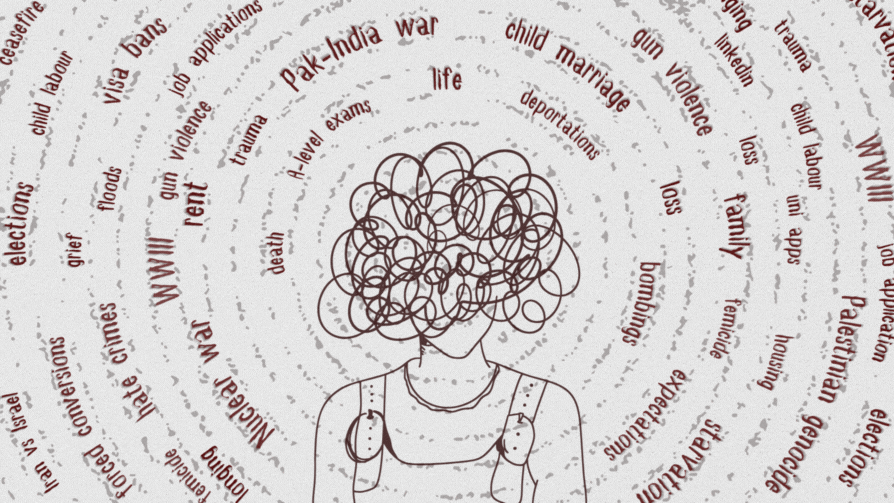This talk in Karachi pit artists against intellectuals but is that really useful?
On the last Thursday of every January, various cities around the world host a ‘Night of Ideas.’
The tradition, conceptualised in Paris, swum its way to the shores of Karachi for the very first time last Thursday, promising a night of debate and idea sharing between guests from all walks of life, interested in ‘Facing the Present’.
The programming, however, was a little less promising, as it arbitrarily divided 'discourse initiators' (as in, the speakers) into categories of ‘artists vs. intellectuals’, asking them to debate over which group was better equipped to deal with the present.
Even the French Ambassador, who greeted us at the event hosted by the Alliance Francaise Karachi, shared his confusion over the programming as he described how artists and intellectuals are often considered to be one and the same in the city that he comes from. The participating panelists shared this sentiment, and the ‘debate’ we were promised unfolded into a series of awkward, sometime angry disclaimers.
As the lazy programming seeped into the lazy debating, we were subjected to a range of speakers who didn’t really end up doing much ‘idea sharing’, and I was left asking two questions - who gets to be an intellectual? And - why are we as a city not more selective with the ‘discourse initiators’ we give space to?
The evening consisted of live graffiti, oral history project screenings and a concert - but the highlight of the night was the 90-minute ‘Public Debate’ with six participants, equally divided into groups of ‘intellectuals’, and ‘artists’.
The intellectuals: Marvi Mazhar, an architect and heritage consultant; Arieb Azhar, director at T2f, musician and writer; and Niilofur Farrukh, art critic, art historian, curator and CEO of the Karachi Biennale Trust. The artists: Saima Zaidi, professor of communications and design at Habib University; Sabiha Sumar, director and producer; and Mohammad Zeeshan, artist and curator of Karachi Biennale 2019.

From a debate which pits artists against ‘intellectuals’, in order to determine who is better equipped to deal with the present, one would expect that distinctions are made on the basis of difference in theoretical approach or outlook. The people behind the programming, however, did not seem to take that into consideration, and one was left questioning what writers and architects share in common that writers and filmmakers don’t - and even more importantly, what makes writers, musicians, architects and art critics ‘intellectuals’ over filmmakers, curators and - wait for it - professors?
While it isn’t fair to synonymise academic professionals with intellectuals, one would expect that the very nature of their profession - a constant engagement and deconstruction of intellectual thought - would afford them a spot on the panel of ‘intellectuals’ representing Karachi. Unfortunately, the only academic representation we got in the debate ended up being a paternalistic narration of community ‘interventions’, devoid of any intellectual framing or context.
Marvi Mazhar was the first to be given the chance to make a case for the ‘intellectuals’. She prefaced what the programme described as ‘TEDx-style talks’ with a disclaimer - she described how she would not classify herself as an artist or an ‘intellectual’, but as an activist when it comes to the preservation of heritage. Her speech was perhaps the most structured, as she explored two urban development projects, detailing how she and her team orchestrated two urban interventions in the shape of the renovation of Pakistan Chowk and the ‘Heritage Walk’.
As she described each intervention she also spoke about the ‘present’ she was ‘facing’ and practices such as ‘mohalla baazi’, or community dialogue, which she was using in order to ensure effective ‘interventions’. Her methods seemed in line with those of a community organiser or mobiliser, much as she had claimed herself - and one was left questioning, again, why the programmers thought those methods were more intellectually inclined than the methods employed by a filmmaker or an art biennale curator.
Next, we had Saima Zaidi, a professor of communications and design at Habib University, who was tasked with making a case for ‘artists’. Her method of ‘cross-pollination’ was framed as a case for an interdisciplinary approach to community interventions, and she also shared her thoughts on the confusing programming, suggesting that ‘the so called ‘boundary’ between the intellectual and the artist is fuzzy.’
But the speech went downhill from there. She described her moment of epiphany - "a cat story from a dog person" — a story about "precocious street children": she was in her car surrounded by children who were supposed to be cleaning her windshield, but were more interested in a cat on the street. So she asked them why they didn’t just go to the zoo if they were so interested in animals, to which they responded - who would take us? And a ‘precocious’ child even went as far as to say ‘you should take us’. This apparently, was her moment of epiphany - that street children in Pakistan have no one to take them to the zoo. Paternalistic, tone deaf and self-absorbed.
Who gets to be an intellectual? And why are we as a city not more selective with the ‘discourse initiators’ we give space to? These are the questions I had at the end of Karachi's Night of Ideas
At this point in the night, one was left questioning why ‘facing the present’ had to look like rich people celebrating the ways in which they were helping everyone else. This concern was only reinforced when Arieb Azhar, the second ‘intellectual’ of the night, was introduced as someone who was interested in ‘intellectual poverty alleviation’ through his work as a musician and as the director of T2f.
Ironically, Azhar prefaced his speech with, "when we talk about intellectuals, we are not talking about drawing room intellectuals, we are talking about ‘serious’ intellectuals." He then went on to share how he identified more as an artist than an intellectual and so would share the ‘artists’ perspective. His basic argument, enveloped in a series of proclamations about ‘universal truths’ and ‘intellectual truths’, was that art is the codification of evolving progressive thought - a fair albeit reductive case to make.
Sabiha Sumar was the next ‘artist’ to present her case , arguing that artistic interventions carry weight because of an artist’s willingness to be wrong. She was the only one who attempted to address the ‘artists vs. intellectuals’ dichotomy that we had all been subjected to - suggesting that intellectuals are interested in measuring, and artists are interested in that which cannot be measured. Again, reductive, and I wish that she had gone on to deconstruct that statement.
Instead, she used the remainder of her speech to tell a story about a boy who overcame his fears and enabled others to do so as well. She did not deconstruct the story or explain to us how it was relevant, but one would assume she was suggesting that artists are better equipped to deal with the present because they are unafraid. A more carefully curated panel of intellectuals would have, perhaps, decimated that suggestion.

Next up, we had Niilofur Farrukh repping the intellectuals, and Muhammad Zeeshan repping the artists. Both figures are closely linked to the Karachi Biennale, and both used up time to market the art biennale during their speeches. In fact, Niilofur Farrukh devoted half her speaking time to playing a Promo Reel for KB19. She described KB17 as one of the methods used by her to ‘face the present’, detailing how artists and intellectuals collectively conceptualized the Karachi Biennale as "a way of breaking the darkness" when "Karachi was experiencing its worst spell of violence four years ago." She then gave us a short spurt of hope as she engaged with the histories and legacies of different intellectuals from a theoretical standpoint (the only person to do so the entire evening), before she went back to marketing the second Karachi Biennale as an ‘intervention’ that we must all attend and participate in.
Muhammad Zeeshan ended the evening, and he perhaps, had the most potent case to make as he argued that our education system is institutionally designed to privilege only a few - as it uses grades and percentages to determine who is allowed in academic spaces, when not everyone has the resources required to attain those grades. He told his own story as he argued that we shouldn’t discriminate on the basis of grades, reminding us that intellectuals aren’t only found in ‘academic spaces’, largely because of how regressive academic spaces can be with their exclusivity. He ended the night by talking to us about how harmful dichotomies can be, and how he disagreed with the programming and the way it had tried classify the participants.
To sum up - two of the three ‘intellectuals’ gave us disclaimers that they did not really identify as ‘intellectuals’, and the methods for ‘Facing the Present’ they offered were: community dialogues and organising art biennales. From the three ‘artists’, one suggested that artists are unafraid of being wrong and therefore equipped to deal with the present, another described their ‘interdisciplinary interventions’ in extremely paternalistic terms, and the third used the opportunity to describe why the structure of the conversation was deeply problematic.

All of this was followed by a vote from the audience - we were expected to decide whether artists or intellectuals were better equipped to deal with the problems faced by our society. As a confused audience clapped away, Bina Shah, the brains behind the programme took to stage, laughing at the "bogus, false dichotomy" that she had set up, in order to trigger debate. I’m still at a loss for understanding exactly what ‘debate’ was triggered by the setting up of this ‘bogus’ dichotomy, which wasted an important opportunity to discuss ideas and brainstorm ways of ‘facing the present’.
Opportunities and spaces for discourse in our city are few in number. Wasting them is no laughing matter - our discourse initiators and enablers owe it to us to use such opportunities to ask important questions and address urgent concerns.
The present in Karachi looks like - mass displacement as the poor are targeted under the guise of an ‘encroachment drive’, enforced disappearances, multiple media layoffs, a need to address our understanding of sexual violence and how to how hold its perpetrators accountable, and the list could go on. The ‘Night of ideas’ was a sad reminder of the disparity in thought that governs relationships in our city. The understanding of the ‘present’ that one could take away from the event, was a far cry from the challenges that are faced by the people in our city.
We do not need to group social commentators and changemakers into camps of ‘intellectuals’ and ‘artists’ in order to trigger debate about ‘facing the present’ - but we do need to ensure that those who are given the space to lead discourse, understand the responsibility that comes with it.













Comments